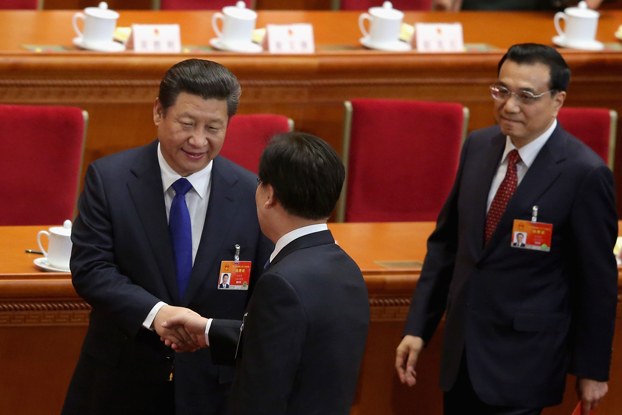Uyghurs: Li Keqiang will be remembered for repression

While Han Chinese are showing an outpouring of grief for the late Premier Li Keqiang, Uyghurs and Tibetans are not displaying any warm sentiments for the official who is remembered more for Beijing’s repression than any economic reforms.
Li, the second-ranked member of the Politburo Standing Committee of the Chinese Communist Party from 2012 to 2022, died of a heart attack on Oct. 26 at age 68.
He played an instrumental role in the Chinese government’s crackdown on the predominantly Muslim Uyghurs and other Turkic minorities in Xinjiang that culminated in the mass detentions of an estimated 1.8 million people in internment camps in 2017 and 2018, two experts on the region said.
Other flagrant right abuses included the torture of detainees, forced abortions and sterilizations of Muslim women, and forced labor that the United States and other nations have identified as genocide.
China has denied the allegations, saying the camps were vocation training centers.
Jojje Olsson, a Swedish journalist who runs Kinamedia, the country’s biggest new site on China, and a related newsletter, tweeted on X, the platform formerly known as Twitter, that people should stop romanticizing Li as a “‘man of the people’ just because he wanted less state control over the economy and didn’t show his cruel side as openly as [Chinese President] Xi [Jinping].”
Xinjiang Papers
Olsson went on to point out that in the so-called Xinjiang Papers, Li called for the implementation of the policies leading to hundreds of thousands of Uyghurs locked up because of their ethnicity.
Leaked in 2019 and first published by The New York Times, the Xinjiang Papers were hundreds of pages of documents detailing the crackdown ordered by Xi and spurred calls for global action to hold Beijing accountable for the abuses.
They told of how Xi called for a “struggle against terrorism, infiltration, and separatism” using the “organs of dictatorship,” in internal speeches following an attack by alleged Uyghur militants that killed more than 30 people at a train station in 2014.
They included statements made by other Chinese Communist Party leaders, including Li, that gave rise to repressive policies, including the internment of Uyghurs and other in “re-education” camps, the sterilization of detained Uyghur women, and the use of Uyghurs in forced factory labor.
“As many has [sic] stated before, upholding ‘liberal’ Premiers like Wen [Jiabao]/Li as ‘reformers’ because they are a bit less hawkish than other CCP leaders is not only wrong; it’s disrespectful to Uyghurs or AIDS victims in Henan. There was [sic] no ‘reformers’ on CCP politburo level since 1989,” tweeted Olsson, who has been banned since 2016 from entering China.
Tainted legacy
Li served as governor and later party leader of Henan province in central China during a scandal over the spread of AIDS through the commercial sale of blood in rural areas, which officials tried to cover up.
Adrian Zenz, director of China Studies at the U.S.-based Victims of Communism Memorial Foundation, who has spent years documenting China’s abuses against Uyghurs, tweeted that his recent research shows Li Keqiang’s economic policy towards Uyghurs—forced labor.
Zenz says his peer-reviewed academic article provides proof that authorities in Xinjiang placed Uyghurs, who refused to accept state work arrangements, as part of a larger poverty alleviation through labor transfer scheme, into camps.
About Li, Zenz tweeted: “He argued that southern Xinjiang’s ‘3 million surplus laborer’ [sic] posed a ‘prominent problem,’ as they are ‘easily exploited by evildoers.’ They must be put to work.”
Tibetans also said Li did nothing to protect their human rights during his years in power, and in a 2018 visit to Tibet reiterated that it was an inalienable part of China.
“The harsh policies adopted against Tibetans and the minorities by the Chinese Communist leaders have remained the same,” said Bawa Kelsang Gyaltsen, the representative of the Office of Tibet in Taiwan. “Even under the premiership of Li Keqiang, the human rights situation of Tibetans inside Tibet remained atrocious and very concerning.”
“Even though the Chinese policies in Tibet became exceptionally restrictive and repressive under Xi Jinping’s leadership, there has not been a single Chinese official who has been vocal enough to talk about these atrocities and repression,” he said..
- RFA report, Oct 30, 2023
https://www.rfa.org/english/news/uyghur/li-keqiang-10302023163434.html
-
Book Shelf
-
 Book Review
DESTINY OF A DYSFUNCTIONAL NUCLEAR STATE
Book Review
DESTINY OF A DYSFUNCTIONAL NUCLEAR STATE
- Book ReviewChina FO Presser Where is the fountainhead of jihad?
- Book ReviewNews Pak Syndrome bedevils Indo-Bangla ties
- Book Review Understanding Vedic Equality….: Book Review
- Book Review Buddhism Made Easy: Book Review
- Book ReviewNews Elegant Summary Of Krishnamurti’s teachings
- Book Review Review: Perspectives: The Timeless Way of Wisdom
- Book ReviewNews Rituals too a world of Rhythm
- Book Review Marx After Marxism
- Book Review John Updike’s Terrorist – a review
-
-
Recent Top Post
-
 Commentaries
Impasse over BRI Projects in Nepal
Commentaries
Impasse over BRI Projects in Nepal
-
 CommentariesNews
Yet another Musical Chairs in Kathmandu
CommentariesNews
Yet another Musical Chairs in Kathmandu
-
 CommentariesTop Story
Spurt in Anti-India Activities in Canada
CommentariesTop Story
Spurt in Anti-India Activities in Canada
-
 NewsTop Story
Nepal: Political Stability Under Threat Again
NewsTop Story
Nepal: Political Stability Under Threat Again
-
 NewsTop Story
Accountability Tryst With 2024 Ballot….
NewsTop Story
Accountability Tryst With 2024 Ballot….
-
 NewsTop Story
What Would “Total Victory” Mean in Gaza?
NewsTop Story
What Would “Total Victory” Mean in Gaza?
-
 CommentariesTop Story
The Occupation of Territory in War
CommentariesTop Story
The Occupation of Territory in War
-
 CommentariesTop Story
Pakistan: Infighting in ruling elite intensifies following shock election result
CommentariesTop Story
Pakistan: Infighting in ruling elite intensifies following shock election result
-
 CommentariesTop Story
Proforma Polls in Pakistan Today
CommentariesTop Story
Proforma Polls in Pakistan Today
-
 CommentariesTop Story
Global South Dithering Away from BRI
CommentariesTop Story
Global South Dithering Away from BRI
-
AdSense code



















